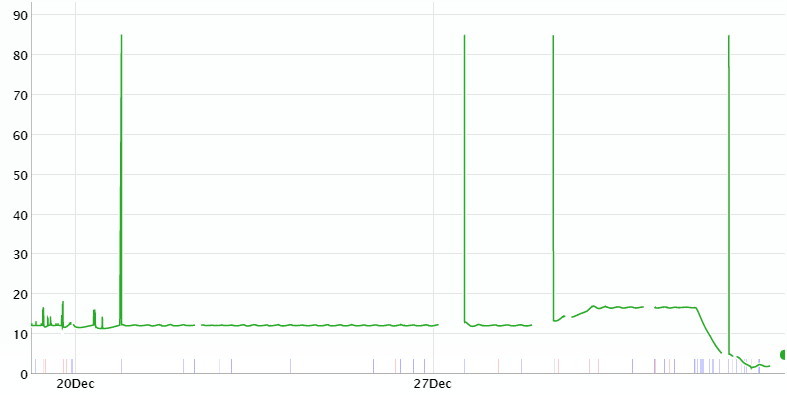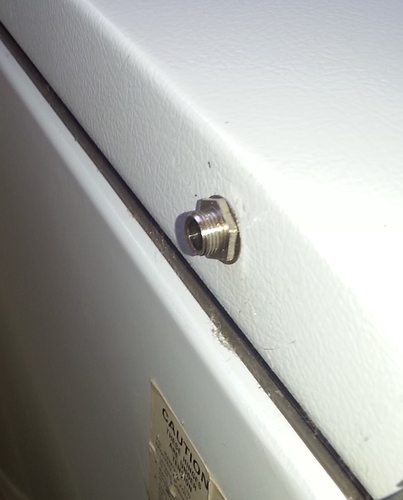Temp sensor reads null value, device slot 0. Temp sensor has value for device slot 1. Switching sensor connections has no effect, null value always read for device slot 0 only. I reprogrammed the Arduino and the tail end of the log is posted below. Of interest is the message indicating that the temperature sensor disconnected pin for device assigned to slot 0. All wires seem to be properly connected, I have separate power supplies for Arduino and Rpi.
Also, when powered up and mode is off, status reported as Idle yet fridge is running!!!
=========================stderr======================================
Apr 06 2015 16:27:36 Found BrewPi v0.2.4, running commit 2a6f7f05 build 40, on an Arduino standard with a revC shield on port /dev/ttyACM0
Apr 06 2015 16:28:03 Installed devices received: []
Apr 06 2015 16:28:03 Available devices received: [{‘a’: ‘28A1EE3F0600000E’, ‘c’: 1, ‘b’: 0, ‘d’: 0, ‘f’: 0, ‘i’: -1, ‘h’: 2, ‘j’: 0.0, ‘p’: 18, ‘t’: 0}, {‘a’: ‘28B79D3F060000C4’, ‘c’: 1, ‘b’: 0, ‘d’: 0, ‘f’: 0, ‘i’: -1, ‘h’: 2, ‘j’: 0.0, ‘p’: 18, ‘t’: 0}, {‘c’: 1, ‘b’: 0, ‘d’: 0, ‘f’: 0, ‘i’: -1, ‘h’: 1, ‘p’: 2, ‘t’: 0, ‘x’: 1}, {‘c’: 1, ‘b’: 0, ‘d’: 0, ‘f’: 0, ‘i’: -1, ‘h’: 1, ‘p’: 5, ‘t’: 0, ‘x’: 1}, {‘c’: 1, ‘b’: 0, ‘d’: 0, ‘f’: 0, ‘i’: -1, ‘h’: 1, ‘p’: 6, ‘t’: 0, ‘x’: 1}, {‘c’: 1, ‘b’: 0, ‘d’: 0, ‘f’: 0, ‘i’: -1, ‘h’: 1, ‘p’: 19, ‘t’: 0, ‘x’: 1}, {‘c’: 1, ‘b’: 0, ‘d’: 0, ‘f’: 0, ‘i’: -1, ‘h’: 1, ‘p’: 4, ‘t’: 0, ‘x’: 1}]
Apr 06 2015 16:28:24 Arduino debug message: WARNING 2: Temperature sensor disconnected pin 18, address 28A1EE3F0600000E
Apr 06 2015 16:28:24 Device updated to: {“i”:0,“t”:1,“c”:1,“b”:1,“f”:9,“h”:2,“d”:0,“p”:18,“a”:“28A1EE3F0600000E”,“j”: 0.000}
Apr 06 2015 16:28:38 Device updated to: {“i”:1,“t”:1,“c”:1,“b”:1,“f”:5,“h”:2,“d”:0,“p”:18,“a”:“28B79D3F060000C4”,“j”: 0.000}
Apr 06 2015 16:28:55 Device updated to: {“i”:2,“t”:3,“c”:1,“b”:0,“f”:2,“h”:1,“d”:0,“p”:2,“x”:1}
Apr 06 2015 16:29:06 Device updated to: {“i”:3,“t”:3,“c”:1,“b”:0,“f”:3,“h”:1,“d”:0,“p”:5,“x”:1}
Apr 06 2015 16:29:17 Installed devices received: [{‘a’: ‘28A1EE3F0600000E’, ‘c’: 1, ‘b’: 1, ‘d’: 0, ‘f’: 9, ‘i’: 0, ‘h’: 2, ‘j’: 0.0, ‘p’: 18, ‘t’: 1}, {‘a’: ‘28B79D3F060000C4’, ‘c’: 1, ‘b’: 1, ‘d’: 0, ‘f’: 5, ‘i’: 1, ‘h’: 2, ‘j’: 0.0, ‘p’: 18, ‘t’: 1}, {‘c’: 1, ‘b’: 0, ‘d’: 0, ‘f’: 2, ‘i’: 2, ‘h’: 1, ‘p’: 2, ‘t’: 3, ‘x’: 1}, {‘c’: 1, ‘b’: 0, ‘d’: 0, ‘f’: 3, ‘i’: 3, ‘h’: 1, ‘p’: 5, ‘t’: 3, ‘x’: 1}]
Apr 06 2015 16:29:17 Available devices received: [{‘c’: 1, ‘b’: 0, ‘d’: 0, ‘f’: 0, ‘i’: -1, ‘h’: 1, ‘p’: 6, ‘t’: 0, ‘x’: 1}, {‘c’: 1, ‘b’: 0, ‘d’: 0, ‘f’: 0, ‘i’: -1, ‘h’: 1, ‘p’: 19, ‘t’: 0, ‘x’: 1}, {‘c’: 1, ‘b’: 0, ‘d’: 0, ‘f’: 0, ‘i’: -1, ‘h’: 1, ‘p’: 4, ‘t’: 0, ‘x’: 1}]
Apr 06 2015 16:29:28 Installed devices received: [{‘a’: ‘28A1EE3F0600000E’, ‘c’: 1, ‘b’: 1, ‘d’: 0, ‘f’: 9, ‘i’: 0, ‘h’: 2, ‘j’: 0.0, ‘p’: 18, ‘t’: 1, ‘v’: None}, {‘a’: ‘28B79D3F060000C4’, ‘c’: 1, ‘b’: 1, ‘d’: 0, ‘f’: 5, ‘i’: 1, ‘h’: 2, ‘j’: 0.0, ‘p’: 18, ‘t’: 1, ‘v’: 13.813}, {‘c’: 1, ‘b’: 0, ‘d’: 0, ‘f’: 2, ‘i’: 2, ‘h’: 1, ‘p’: 2, ‘t’: 3, ‘v’: 0, ‘x’: 1}, {‘c’: 1, ‘b’: 0, ‘d’: 0, ‘f’: 3, ‘i’: 3, ‘h’: 1, ‘p’: 5, ‘t’: 3, ‘v’: 0, ‘x’: 1}]
Apr 06 2015 16:29:28 Available devices received: [{‘c’: 1, ‘b’: 0, ‘d’: 0, ‘f’: 0, ‘i’: -1, ‘h’: 1, ‘p’: 6, ‘t’: 0, ‘x’: 1}, {‘c’: 1, ‘b’: 0, ‘d’: 0, ‘f’: 0, ‘i’: -1, ‘h’: 1, ‘p’: 19, ‘t’: 0, ‘x’: 1}, {‘c’: 1, ‘b’: 0, ‘d’: 0, ‘f’: 0, ‘i’: -1, ‘h’: 1, ‘p’: 4, ‘t’: 0, ‘x’: 1}]


